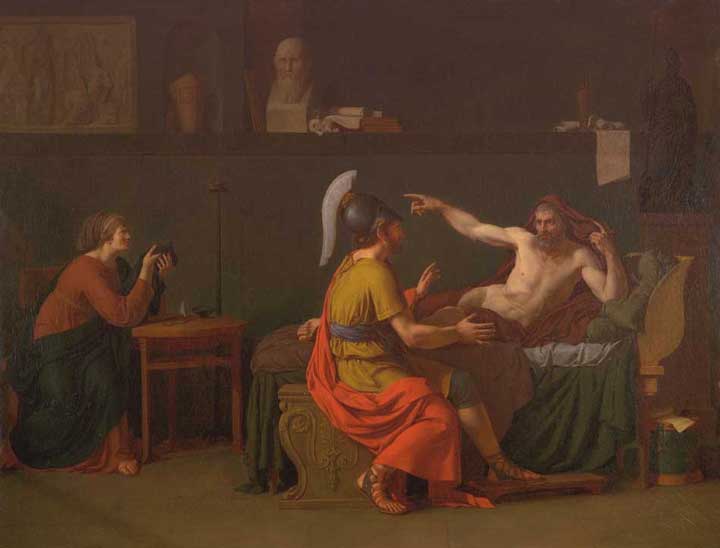According to the following account, Hesiod died for another man’s crimes. His corpse was moved by dolphins.
Plutarch, Dinner of the Seven Wise Men 19 (= Moralia 162d-e)
“Hesiod’s misfortune was rather human and like our own—you have probably heard the story”
‘No, I have not’, I said.
‘Well, it is really worth hearing. It seems that Hesiod was sharing hospitality and a place with a man from Miletus when they were in Lokris. When the other guy was secretly having sex with their host’s daughter and was caught, he had suspicion that Hesiod knew from the beginning and conspired to hide the offense—even though he was responsible for nothing, he wrongly encountered untimely rage and slander. For the brothers of the girl killed him after they ambushed him near the Nemeion in Lokris, and they killed his servant, named Troilos, too.
After the bodies were pushed out into the river Daphnos, Troilos’ was carried to a boulder washed by water, positioned a little bit out into the sea. And to this day the boulder is called Troilos. A pod of dolphins took Hesiod’s body right away and conveyed it first to Rhion and Molykria. It just happened that the Lokrian sacrifice at Rhion and their assembly, which they hold occasionally even to our time in that place, was in progress at that time. When the body showed up, carried as it was, they were amazed at the chance and they ran down and, when they recognized the corpse since it was still rather fresh, they considered everything secondary to investigating the murder, all because of Hesiod’s fame
They accomplished this quickly by discovering the murderers [a dog went barking and hunting the murderers with a shout]. They put them still alive in the sea and destroyed their homes. Hesiod was then buried near Nemeia. Many people foreign to the region do not know where the grave is. It is hidden because, as they claim, it was sought by the people of Orkhomenos who wanted to transfer the remains to their vicinity in accordance with an oracle.”

.
Plutarchi sept. sap. conv. 19 (Hercher): ἀνθρώπινον δὲ καὶ πρὸς ἡμᾶς τὸ τοῦ ῾Ησιόδου πάθος· ἀκήκοας γὰρ ἴσως τὸν λόγον. Οὐκ ἔγωγε, εἶπον. ᾿Αλλὰ μὴν ἄξιον πυθέσθαι.
Μιλησίου γὰρ ὡς ἔοικεν ἀνδρός, ᾧ ξενίας ἐκοινώνει ὁ ῾Ησίοδος καὶ διαίτης ἐν Λοκροῖς, τῇ τοῦ ξένου θυγατρὶ κρύφα συγγενομένου καὶ φωραθέντος, ὑποψίαν ἔσχεν ὡς γνοὺς ἀπ’ ἀρχῆς καὶ συνεπικρύψας τὸ ἀδίκημα, μηδενὸς ὢν αἴτιος ὀργῇ δ’ ἀκαίρῳ καὶ διαβολῇ περιπεσὼν ἀδίκως. ἀπέκτειναν γὰρ αὐτὸν οἱ τῆς παιδίσκης ἀδελφοὶ περὶ τὸ Λοκρικὸν Νέμειον ἐνεδρεύσαντες καὶ μετ’ αὐτοῦ τὸν ἀκόλουθον ᾧ Τρωίλος ἦν ὄνομα. τῶν δὲ σωμάτων εἰς τὸν Δάφνον ποταμὸν ὠσθέντων τὸ μὲν τοῦ Τρωίλου εἰς τὴν θάλασσαν ἔξω φορούμενον ἐπεσχέθη περικλύστῳ χοιράδι μικρὸν ὑπὲρ τὴν θάλασσαν ἀνεχούσῃ· καὶ μέχρι νῦν Τρωίλος ἡ χοιρὰς καλεῖται. τοῦ δ’ ῾Ησιόδου τὸν νεκρὸν εὐθὺς ἀπὸ γῆς ὑπολαβοῦσα δελφίνων ἀγέλη πρὸς τὸ ῾Ρίον ἐκόμιζε καὶ τὴν Μολυκρίαν. ἐτύγχανε δὲ Λοκροῖς ἡ τῶν ῾Ρίων καθεστῶσα θυσία καὶ πανήγυρις, ἣν ἄγουσιν ἔτι νῦν περιφανῶς περὶ τὸν τόπον ἐκεῖνον. ὡς δ’ ὤφθη προσφερόμενον τὸ σῶμα, θαυμάσαντες ὡς εἰκὸς ἐπὶ τὴν ἀκτὴν κατέδραμον καὶ γνωρίσαντες ἔτι πρόσφατον τὸν νεκρόν, ἅπαντα δεύτερα τοῦ ζητεῖν τὸν φόνον ἐποιοῦντο διὰ τὴν δόξαν τοῦ ῾Ησιόδου. καὶ τοῦτο μὲν ταχέως ἔπραξαν εὑρόντες τοὺς φονέας (add. Plut. de soll. an. 36: τοῦ κυνὸς ὑλακτοῦντος καὶ μετὰ βοῆς ἐπιφερομένου τοῖς φονεῦσιν)· αὐτούς τε γὰρ κατεπόντισαν ζῶντας καὶ τὴν οἰκίαν κατέσκαψαν. ἐτάφη δ’ ὁ ῾Ησίοδος πρὸς τῷ Νεμείῳ· τὸν δὲ τάφον οἱ πολλοὶ τῶν ξένων οὐκ ἴσασιν, ἀλλ’ ἀποκέκρυπται, ζητούμενος ὑπ’ ᾿Ορχομενίων, ὥς φασι, βουλομένων κατὰ χρησμὸν ἀνελέσθαι τὰ λείψανα καὶ θάψαι παρ’ αὑτοῖς.
The Certamen of Homer and Hesiod has a similar account but with some differences
“After the contest [with Homer] was over, Hesiod went to Delphi to get an oracle and to make a thanks-offering for the victory to the god. When he arrived at the shrine, people claim that the prophetess was inspired and said:
“This lucky man who travels to my home
Is Hesiod, honored by the divine Muses.
His fame will spread as far as the sun shines.
But guard against the gorgeous grove of Nemeian Zeus.
It is there where your fated death will come.”
Hesiod, after he heard this oracle, went retreating from the Peloponnese because he believed that the god meant the oracle there. He went to Oinoê in Lokris and rested with Amphiphanes and Ganuktôr, the children of Phêgeus, and he really did not understand the oracle. For this place was called the shrine of Zeus Nemeios. After he spent a period of time with the Oineans, the youths, because they suspected that Hesiod fornicated with their sister, killed him and through hem into the sea between Euboia and Lokris.
When the abandoned corpse was carried by dolphins to land, there was some local festival happening and everyone ran to the shore. Once they recognized who this was, they grieved and buried him—and then they began to seek his murderers. The brothers, because they feared the rage of the citizens, made off with a fishing skiff and sailed toward Krêtê. Zeus struck that vessel in the middle with lightening and submerged them in the sea, as Alkidamas says in the Mouseion.
Eratosthenes says in his epode that Ktimenos and Antiphon, the sons of Ganuktôr, were arrested for the aforementioned reason and sacrificed to the gods of hospitality by Eurukles the prophet. According to the same author, The virgin sister of these men hanged herself after she was raped—and Eratosthenes says she was raped by some stranger on the road who was named Hesiod, the son of Dêmades. He was also killed by the same men. Later, the Orkhomenians, in accordance with an oracle, transferred Hesiod and buried them in their land….”
Cert. Hom. et Hes. v. 214 West. (unde eadem Tzetzes
τοῦ δὲ ἀγῶνος διαλυθέντος διέπλευσεν ὁ ῾Ησίοδος εἰς Δελφοὺς χρησόμενος καὶ τῆς νίκης ἀπαρχὰς τῷ θεῷ ἀναθήσων. προσερχομένου δὲ αὐτοῦ τῷ ναῷ ἔνθεον γενομένην τὴν προφῆτίν φασιν εἰπεῖν
ὄλβιος οὗτος ἀνήρ, ὃς ἐμὸν δόμον ἀμφιπολεύει,
῾Ησίοδος Μούσῃσι τετιμένος ἀθανάτῃσι·
τοῦ δή τοι κλέος ἔσται ὅσην τ’ ἐπικίδναται ἠώς.
ἀλλὰ Διὸς πεφύλαξο Νεμείου κάλλιμον ἄλσος·
κεῖθι δέ τοι θανάτοιο τέλος πεπρωμένον ἐστίν.
ὁ δὲ ῾Ησίοδος ἀκούσας τοῦ χρησμοῦ τῆς Πελοποννήσου μὲν ἀνεχώρει νομίσας τὴν ἐκεῖ Νεμέαν τὸν θεὸν λέγειν, εἰς δὲ Οἰνόην τῆς Λοκρίδος ἐλθὼν καταλύει παρὰ ᾿Αμφιφάνει καὶ Γανύκτορι, τοῖς Φηγέως παισίν, ἀγνοήσας τὸ μαντεῖον· ὁ γὰρ τόπος οὗτος ἐκαλεῖτο Διὸς Νεμείου ἱερόν. διατριβῆς δ’ αὐτῷ πλείονος γενομένης ἐν τοῖς Οἰνεῶσιν, ὑπονοήσαντες οἱ νεανίσκοι τὴν ἀδελφὴν αὐτῶν μοιχεύειν τὸν ῾Ησίοδον, ἀποκτείναντες εἰς τὸ μεταξὺ τῆς Εὐβοίας καὶ τῆς Λοκρίδος πέλαγος κατεπόντισαν.
τοῦ δὲ νεκροῦ τριταίου πρὸς τὴν γῆν ὑπὸ δελφίνων προσενεχθέντος, ἑορτῆς τινὸς ἐπιχωρίου παρ’ αὐτοῖς οὔσης ἀριαδνείας πάντες ἐπὶ τὸν αἰγιαλὸν ἔδραμον καὶ τὸ σῶμα γνωρίσαντες ἐκεῖνο μὲν πενθήσαντες ἔθαψαν, τοὺς δὲ φονεῖς ἀνεζήτουν. οἱ δὲ φοβηθέντες τὴν τῶν πολιτῶν ὀργήν, κατασπάσαντες ἁλιευτικὸν σκάφος διέπλευσαν εἰς Κρήτην. οὓς κατὰ μέσον τὸν πλοῦν ὁ Ζεὺς κεραυνωθεὶς κατεπόντωσεν, ὥς φησιν ᾿Αλκιδάμας ἐν μουσείῳ φησιν ᾿Αλκιδάμας ἐν Μουσείῳ.
᾿Ερατοσθένης δέ φησιν ἐν † ἐνηπόδω † Κτίμενον καὶ ῎Αντιφον τοὺς Γανύκτορος ἐπὶ τῇ προειρημένῃ αἰτίᾳ ἀνελόντας σφαγιασθῆναι θεοῖς τοῖς ξενίοις ὑπ’ Εὐρυκλέους τοῦ μάντεως. τὴν μέντοι παρθένον τὴν ἀδελφὴν τῶν προειρημένων μετὰ τὴν φθορὰν ἑαυτὴν ἀναρτῆσαι, φθαρῆναι δὲ ὑπό τινος ξένου συνόδου τοῦ ῾Ησιόδου Δημώδους ὄνομα· ὃν καὶ αὐτὸν ἀναιρεθῆναι ὑπὸ τῶν αὐτῶν φησιν. ὕστερον δὲ ᾿Ορχομένιοι κατὰ χρησμὸν μετενέγκαντες αὐτὸν παρ’ αὑτοῖς ἔθαψαν καὶ ἐπέγραψαν ἐπὶ τῷ τάφῳ·
Like this:
Like Loading...









